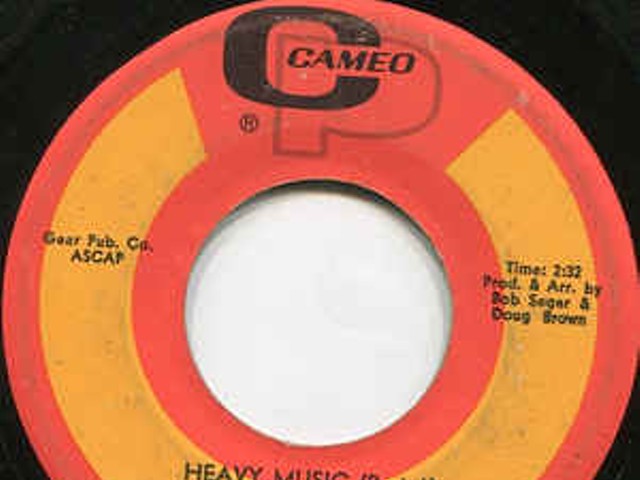Benny Reeves is having car trouble. Several hours ago, his Lincoln nearly caught fire. Several decades earlier, his music career nearly did.
In 1959, a 21-year-old Reeves moved back to Detroit after a four-year "kitty cruise" in the Navy. While home, a then-little-known vocal group called the Contours recruited him for a couple basement rehearsals at the corner of Blaine and Woodrow Wilson in the city's Virginia Park neighborhood. The band, whose debut single "Whole Lotta Woman" fizzled upon its initial release in February 1961, was down a baritone singer ("because he couldn't dance," says original Contour Joe Billingslea) when a personnel tip came from an unlikely source: Reeves' sister, Martha Reeves, who at the time was the receptionist for record label Motown.
"We talked about it down at the studio and Martha overheard us and said that her brother Benny could sing," Billingslea says. "So I got in touch with Benny and had Benny come to a rehearsal. And he was hitting it so we added him to the group. He really can sing. He was singing baritone and bass. And if he hadn't been in the military, he would've been with the Contours."
Reeves was chiefly concerned with the financial well-being of his family, so he returned to military service in Norfolk, Va., shortly after those sessions. Much of his small but steady paychecks were sent back home to his parents in Detroit. "When I was back in the military, I met the Contours in D.C. and they said that I was fired," Reeves says. "Then when I saw Joe [Billingslea] a couple times after that, the group had split. There's two different Contours now. So I said, 'Well hell, I'll just start me one.' And he said, 'No you can't; I'll sue you.' Well, I'd rather work alone anyway. All those different personalities to fool with."
Reeves watched from a distance as the label's ambitious young founder, Berry Gordy Jr., swapped the steel studs and rubber treads of the Ford Motor Co. manufacturing process for more lasting components. The final product of the Motown machine was music immortality, and the Contours were going to live forever.
Within a year and a half of Reeves' departure, Gordy wrote and produced the group's platinum hit, "Do You Love Me." A jittery amalgam of contemporary dance music supposedly intended for the pre-David Ruffin Temptations, the track was recorded using the same enchanted sound equipment still housed at Hitsville U.S.A.'s Studio A today. Four months after its release on Motown subsidiary Gordy, with the Cuban Missile Crisis still raging, a country on the verge of nuclear catastrophe found shelter in the Funk Brothers' groove. "Do You Love Me" hit No. 1 on the Billboard R&B singles chart on Oct. 20, 1962.
"Of course, you know they all got rich and shit," Reeves says. "But the money? They had a problem too. There's very few of them left. [Three of the five original Contours have died.] Well, I learned a bunch. I learned a whole bunch just from being in the military. It was a good career. I wouldn't trade that for nothing in the world."
Born in tiny Baker Hill, Ala., in 1938, Reeves is the oldest of Elijah and Ruby Reeves' dozen children. A few years after his birth, the parents ("still making babies like mad," Reeves says) moved the growing young family from the Heart of Dixie to the Motor City, where his grandfather was a minister at Detroit's Metropolitan AME Church. There, Reeves honed his immense, gale-force voice into an on-demand hurricane, winning local church talent contests by injecting soul-shaking power into the trademark close harmonies of a cappella gospel music.
Even so, precocious talent wasn't an exemption from familial duty for the Reeves' eldest son. He was the family's "built-in baby sitter," changing dirty diapers and mediating sibling friction; maintaining his parents' sanity by maintaining household order.
Still a year shy of his 18th birthday and acutely aware of the fact that the family home was becoming overcrowded, Reeves first joined the Navy in 1955. Characteristically matter-of-fact when explaining the life-altering decision, he chuckles at what was crystal-clearly self-evident to him: "There was 12 [kids] in the family; somebody had to get the hell out of the house," Reeves says. And so he did. First as a means of supporting his parents, then as a means of supporting himself, Reeves served in the U.S. military for 25 years.
The constant during that period of forced transience was music. Of his first post-bootcamp duty station in Oppama, Japan, Reeves recalls, "I knew absolutely nothing, but I could always sing." "Seemed like everywhere I went, somebody wanted to start a group," he says. "You sit in with a group and the next thing you know, you're in the band. I went into the military and first thing I did was get a band together."
At the time, informal military rock bands historically played in packed officers' clubs or "O clubs," social venues exclusively open to those with a rank of lieutenant or higher. So while his former band mates crisscrossed the country as part of the Motortown Revue — a series of concerts showcasing major Motown talents, including Marvin Gaye, the Supremes, the Miracles, and Little Stevie Wonder — Reeves sang his ass off for midshipmen, enlisted sailors, and commissioned officers in the Navy's officers' clubs and enlisted clubs until his retirement from the armed forces in 1980. A working-class man with a world-class talent, he then headed back to the Midwest in search of a new audience.
It wasn't easy. "If you didn't have a college education, you couldn't get work because everything was [becoming] computerized," Reeves says. "Everything shined like buffalo nickels and you had to know how to punch all the buttons." Still, Reeves, who refers to his brother Thomas as "the smart one," found a formula. In the '80s and '90s, he played approximately 750 gigs with the United Show Band and Groove Company, while simultaneously working as a warehouse supervisor for the Detroit Department of Transportation.
You've likely never heard of either band.
But that doesn't matter to Reeves, who confidently says he's never once had a bad day onstage. Not even when a Ku Klux Klan rally was happening a few blocks from a performance in Howell in the '80s. "The Klan was parading up there and we played right down the street," Reeves says. "Right down the street from City Hall. I don't know what they was clowning about. I have no idea." Howell, formerly the home of Robert E. Miles, a grand dragon of the Ku Klux Klan, was then "branded as a haven of white supremacist activity," according to The New York Times. Yet Reeves kept performing there, kept grinding, kept hustlin'. There was no other option.
Reeves, to borrow a phrase, hustles harder. Whether a sailor, a singer — or today, an Uber driver — Reeves has never lifted his nose from the proverbial grindstone. That approach, it seems, is emulative of his father's values. "Dad always had a job," Reeves says. "He worked for the water department, Packard, Hudson's. He always had a job, but he was the only one [in the family with a job]."
With that hardship in mind, the motivation for Reeves' permanent return to the city of Detroit in 1982 mirrored that of his departure 27 years earlier: family business. "I came back when Mom and Pop got sick," he says. "I was living in Illinois at the time. Dad called me up and said he had six months to live. And mom was sick too. Being the oldest, he wanted me to come home. So I did."
Within a few months, Reeves assumed the familiar position of family caretaker, moving in with his parents in Detroit. His memories of the somber time flutter between a noble sense of obligation ("I had to help") and sober assessment ("you know, you get stuck"), but he seemingly harbors no retrospective ambivalence. Family always came first, even when it meant uprooting his own life.
That's what Reeves did. The straightforward narrative of missed opportunity — of a man tantalizingly close to stardom — is incomplete. After all, it assumes that Reeves craved the byproducts of fame and fortune. It assumes that envy is the obvious response to the success of others. And it assumes a cookie-cutter treatise on the materialistic nature of human ambition. More, more, more.
As we all know, reductive assumptions and judgments often reveal more of the observer than the subject. That's why a gifted, charismatic singer content with a blue-collar life seems like an impossibility. Reeves doesn't regret joining the Navy a lifetime ago ("absolutely not"). He doesn't resent his younger sister Martha's success ("I'm her biggest fan"). Reeves, now 78, doesn't define himself by what ifs and should haves. Family mattered first and foremost. Then music mattered. Trade-offs were always an accepted part of the equation.
So there's Reeves the everyman, a character whose tough luck you immediately identify with. Then there's Reeves the frontman, who cocksurely says "nobody can do what I do [onstage]." There's Reeves the dedicated family man, the loyal military man, the tireless working man, and a hundred other shorthand versions of the man. The braided helixes of these characters make Reeves a living, breathing human being who never desired deification or immortality because he plainly recognizes them as fabrication. Nobody — famous or anonymous, wealthy or working class — lives forever.
The next time I see Reeves, his Lincoln is fixed. He jokingly scolds me for "grilling" him again, over lunch. Then, as we're saying our goodbyes in the parking lot, he pulls a compact disc out of the car's trunk. He hands it to me. My eyes fix on the cover: The Paul Carey Organ Trio Featuring Benny Reeves. He says he's going to make a few calls — hopefully get another band together for some shows. Reeves is still hustlin'. Always hustlin'.
He remains available for shows, and can be reached at facebook.com/benny.reeves1.





